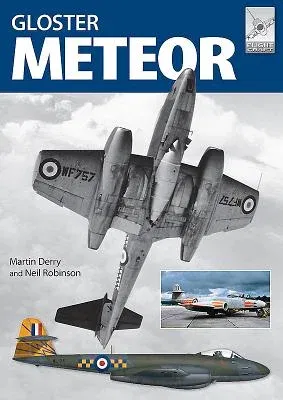The Gloster F.9/40 was Britain's first jet fighter and as the Meteor F.I
became the first jet-powered aircraft of any description to enter
service with the Allies in World War II. Several early Meteors were
dispatched to Europe in the hope that 1945 might witness the first ever
jet-on-jet combats between it and the much-vaunted German jets - a
contest which, in the event, was never to occur.
Postwar, and the Meteor quickly became the backbone of the UK's day
fighter defenses, progressing through successive Marks as it did so,
until finally being replaced on the front line by later types during the
mid-1950s. With their ever-adaptable airframe, two-seat Meteors became
Britain's primary night fighter too, serving for several years until
replaced by the Gloster Javelin from the late 1950s onwards.
With its operational career over, the Meteor's adaptability and
ruggedness was put to sterling use as an advanced trainer, the most
obvious example of which was the T.7\ As late as 1982, a handful of
stalwarts were still soldiering on.
Although space precludes a comprehensive history of such a prolific
aircraft, it is hoped that both aviation enthusiasts and aircraft
modelers may find some interesting examples in these pages, and
sufficient inspiration to help them choose which color scheme to finish
their latest Meteor model in.
This latest addition to the FlightCraft range follows our
well-established format in that it is split into three primary sections.
The first covers the Meteor using numerous photographs, informative
captions and tables. The second is a 16-page full-color illustration
section featuring detailed profiles and 2-views of many of the color
schemes and markings carried by British Meteors. The final section lists
as many injection-moulded plastic model kits of the Meteor, in all the
major scales, that the authors could obtain, plus a gallery of models
made by some of the UK's best modelers.

